let me build the context on why a chapter on Human behavior (Finance) is towards the end in this section and not in the beginning .. it is because that the prior chapters build a case that human behavior is caused and is based on emotions, as proven in various sciences such as biology, psychology, sociology, physics (parallel to objects’ behavior) & astrology (Vedic Science) & in this chapter, i am leveraging those facts to build a case for predictable nature of human behavior in making Financial decisions & followed by risk taking in next chapter.
investing is like buying a bag of potatoes …
If you ever talked to me about investing in stocks in person, there is a good chance that i shared the story about a bag of potatoes – if not, here we go
say you go to a grocery store to buy a bag of potatoes & you just find out that they are on sale; i.e. it’s buy one, get one free sale — do you ?
A) become happy – let’s eat potatoes for next week
B) potatoes are too cheap – i will buy next week, when they are NOT on sale
C) think about why the hell potatoes are on sale, there must be something wrong with them – my guess, most people go with option A.
now think about the same situation in stock market … you woke up one day and found that stocks have come down 50% (think where were you in Mar 2003 & Mar 2009); which is same as stock on sale at buy one get one free (same as potatoes previous paragraph) … would you ?
A) feel good thinking, today is my lucky day
B) be so scared that you start planning to sell whatever stocks you own …?
C) say who cares about the market going down 50%, let me enjoy my b’fast
… most people will have some variation of option B & if you react as in C, then you have good control of your emotions.
the point of comparing the above two situations is that people react to exactly opposite when dealing with stocks/investments versus other goods, although both stocks and potatoes serve a similar purpose in our life; i.e. consumption at a later point after we buy them; we get happy when potatoes are on sale, but get sacred when stocks are on sale – this is human behavior.


investing & potatoes … part II
& here is the second part of the story – you visit the store the following week, & this time the price of potatoes have gone up than normal – would you ?
A) buy more potatoes than you bought last time
B) buy less than last time
C) skip buying potatoes this week since you had them last week
… my guess most people will go for C, although some may go for B
now consider the same situation in stock market, as stocks go up (think about how market has progressed in last few years – 2015-2018), do you ?
A) buy more
B) buy less
C) not buy at all as years go by, as the prices are going up
… most people buy more stock as prices go up; i.e. stock become more expensive (as growth may be stagnating) … why ? … simply because this is human behavior ..!
& now … part III
got to be a part III as the potatoes are looking better …
let’s say that the truck drivers gone on strike for several weeks and the supply of potatoes is limited in the storage .. so as you go to buy groceries each week, the price of potatoes keep going up .. at one time you get so tired of paying higher price each week, you bought several bags which will last for weeks so you don’t pay higher price next week .. just to find out next week that the strike got over and the price of potatoes came down significantly, as all that supply which got backed up in the channel & is now available for sale.
something very similar to this is what happens in stock market when general population starts buying the stocks like crazy, stocks become in short supply; hence, the price go up so much that people start worrying about FOMO (fear of missing out) and hence buy in bulk simply to find out that suddenly big boys start going in opposite direction (selling) resulting in a market crash.

investing vs trading
it is extremely important to understand the difference between the two before you take any action because what will help yo doing one will hurts you in the other case.
investing is best done by Warren Buffet … he invests in a company without having any expectations its future price .. you never heard him talking about his buy or expected sale price for any security/company .. he simply buys one to collect cash from it so he can invest it at other places – such an arrangement is only possible when he owns the whole company but in case of public companies, its equivalent will be dividend (unfortunately, unlike him, its double taxed for you); & if a company continues to generate more cash each year, its value goes up, but he is not bothered by that part … another example of investing is what you do for retirement … you invest part of your income throughout your active career with an expectation that it will grow to a large sum so you can retire and enjoy a good life.
OTOH, trading is simply done that you find an aberration in the price of a security which you expect to disappear in certain interval; e.g. if a stock is selling at $100 & you think it is because of some reason(s) which will disappear in certain time-frame (days, weeks, months) & the after that a target price would be $150; so buy you do a buy trade and wait for it to achieve your target price.
your actions and behaviors are totally different between investments and trading and you got to be really clear on what are you doing … one of a joke on Wall Street is “how a bad trade turns into a long-term investments ..! “
how do emotions impact our investment decisions ..?
most humans are not creatures of logic, rather creatures of emotions; bristling with prejudices and motivated by pride and vanity … so, how does it impact our investments ..? … well, being emotional, we think we can beat the market, but most of us can’t .. why ..?
humans relate to buying securities when they have already gone up as market shows optimism … after the purchase, you become enthusiastic and biased as profits rise, and you buy more, which turns into exuberance & finally it becomes euphoria … and then you hold on to them, when market is going down thinking it is just your anxiety, as it is really hard to sell something at a loss, as you do price comparison from the market peak … you console ourselves that the downturn is temporary, as things will be fine in long-term – denial state … and then, a short term plan turns into a long term strategy – a common phrase used by experts in media – “we invest for the long-term ..!”
however, as the market continues to go down, you become impatient and fearful and give up when the market is close to the bottom, as fear turns into panic (forget the long term strategy and get me out of market ..!) … after the panic you watch the market capitulate, but you don’t have the courage to buy, as you just sold our positions; and you watch the market drop precipitously at the bottom.
again, you buy when securities have already gained momentum … and this time we sell it for a profit and get a relief “aha, i became smarter as i made money this time as the short term strategy worked ..!” to your dismay, as we watch that the market continues to rise … it turns into optimism … then enthusiasm … and then exuberance … and the cycle continues … see the picture on the right.
you know Einstein gave a relationship between space & time so i borrowed some stuff from him (hey, he was born before me !) to build the relationship between price & time of a security which goes like, price of a security is a function of human emotions, which run in cycles .
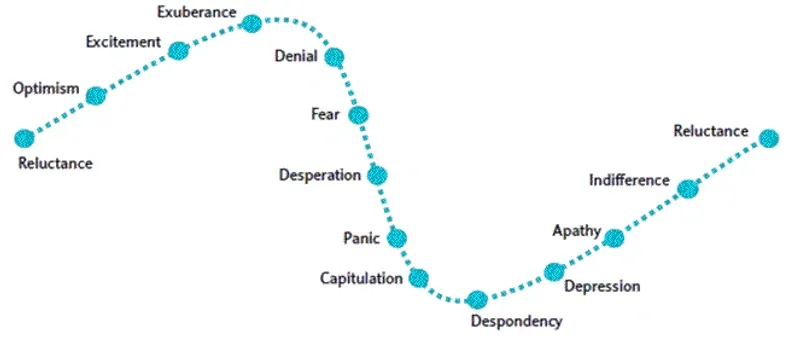
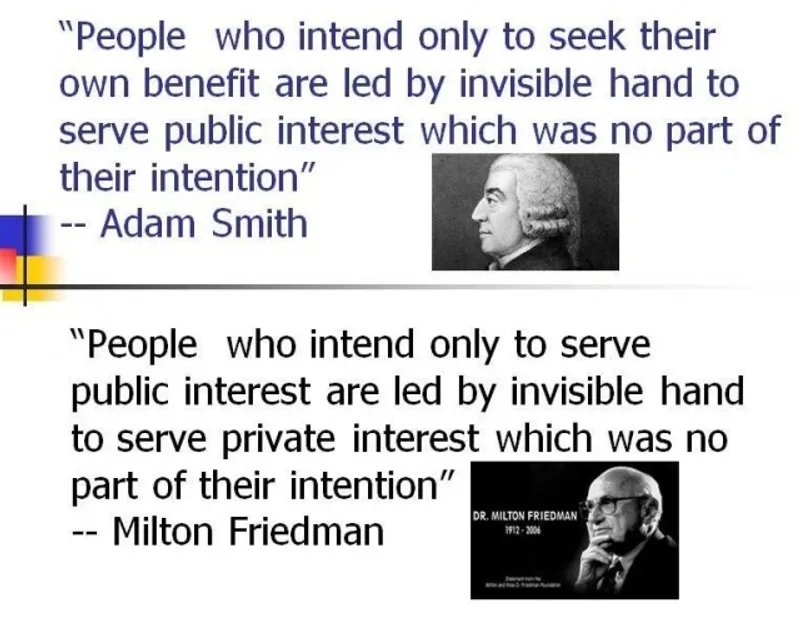
why study human behavior .. aren’t we driven by Adam Smith’s invisible hand ?
well, as applicable in most business & human situations … the answer is, it depends ..!
let me take an example … look around you … in your home, office, neighborhood … how many people do you know who buy lottery tickets, including you … yes, i am talking about the person who is reading this paragraph … how many times in your life have you bought a lottery ticket ?
for power-ball [lottery] the odds of winning are one in many millions .. even though the odds are different for each lottery situation, none of them provide odds more than 50% to an individual … still, people buy lottery tickets .. some regularly .. why is the invisible hand not guiding their decisions ..? because we are human … and hope keeps us going to buy lottery tickets … week after week, without taking a pause … & without thinking that a regular buyer @ $5/week may spend ~$10K over lifetime … now that’s a big sum for an average American … compare this amount to average individual savings … in behavior economics, buying a lottery is considered an irrational behavior … similar to throwing your money in a garbage can, while thinking/consoling themselves that their odds of winning were the same as the person who won
such behavior can not be explained using traditional economics.
where is the stock market headed ..?
this is the most frequently asked question … & the short answer is that it doesn’t matter ..!
let me start giving an analogy: stock markets are like freeways where the traffic runs non-stop throughout the day … you are sitting in a cab and asking the driver where this road is going … & the driver says, “it doesn’t matter where the road is going, rather the question is: where do you want to go and is this the right road to take you there ..?”
people feel a shock when i tell them that it does not matter where the market is headed … further, i tell them that the appropriate questions to ask themselves are their own behavior; so, the more you know about yourself, better will be your returns .. sounds strange, yes it is ..
so, here are the first two questions (for next set, go to Humans/Individuals page) for you:
1) What’s your investment time frame ..?
2) Who are you [as a participant in stock market] – i..e your own behavior?
and, in general, people haven’t given any thought to these questions … until now …
anyway, here are three possible scenarios regardless of the answers to above questions:
1) if you consider yourself an investor, which typically means that your holding time frame is more than 5 years, then it does not matter where the market is heading, as investors should put a fix amount of money into market at a regular interval, regardless of its direction
2) if you are a trader, i.e. your holding time frame varies from minutes to weeks, then also the market direction does not matter because you should be making money due to market movements in 7 directions – long, short, sideways and their combinations (can you guess all 7?)
3) if neither of above applies to you, then you are in between the two categories (trader and investor); i.e. a speculator … who gets in a cab and asks the driver to drive him around the town to find his destination … you are restless (as market is not going in his direction) & clueless (why the heck market is not going in my direction .?) … who has an expected return set in his mind i.e. has a set buy & sell price targets regardless of market conditions … surprisingly, a good % of us fall into this middle category, although you may think the cab story doesn’t apply to you, but that’s precisely most people deal in stock market … who think that have they figured out the right moments to get in and out of the market … moments that never arrive … and even when the moments do arrive, speculators can not make use of them … as they watch market moving inch-by-inch every day as bystanders (कारवां गुजर गया, मोहम्मद रफ़ी) … these folks end up buying too late & selling too early and then kick themselves for leaving/losing money and then make further mistakes by jumping into a new transaction … again, at a wrong time .. for folks in this category… here is my question to you: have you calculated your yearly returns [on capital] in last five years ..? if not, do calculate your return on “capital available for investments” (use the money that is sitting in your brokerage a/c & not the specific trade/investment returns that made you big money!) and compare it to S&P 500 (including dividends) and you will be shocked with the results because chances are high that you are not matching the returns of S&P 500.
in most cases, your returns will be lower than S&P 500, which means you are making less money because you are making decisions based on emotions … my suggestion to you is to stop speculating & move into the investor category, where you will make much more … and, in a rare case, if your returns are higher than S&P 500, then you should become a full-time trader (but before you do that, you should first answer the next question) … in either case, you will live happily ever after, and stop wondering where the market is heading … i.e. the question is moot & the short answer is that it doesn’t matter ..!
so i formulated, “ask not where the market is going, rather figure out who/where you are and where you wanna go & find a road that can take you there ?”
it doesn’t matter where the market is going, what matters is your behavior
let me share a story with you: say it is Feb’ 2018, market just dropped 10% (from 2850 to 2530), you got worried, so decided to meet an advisor / friend for an advice … to make it interesting, say you meet two of them … just to have a second opinion to validate the other … & one of them tells you that the market is going towards 3000 (let’s call this guy as optimist), while the other person tells you that market is heading 2000 (a pessimist) – a 33% difference to make it really interesting .. although it’s an example, but let me assure you that it’s based on opinions from real well-known people who appear in media.
you return home, decided to sleep over it & then mysteriously i appear in your dreams (why would i show up in your dream is another story !) & tell you that i come from future and both the advisors are right and then i disappear.
the key in this situation is your own behavior & how you react to these data points .. & here is how the story continues.
you give a deep thought to the fact that the two targets are so far apart .. it’s Q1’ 2018, economy is doing fine, things don’t look so bad; so the guy predicting 3000 must be right .. why think as a pessimist ..? & how the hell both the advisors can be right at the same time ..? so, this dream guy is definitely a fake; as he showed up simply to cause confusion; otherwise, why would he show up in a dream ..? market has been going up in last 8+ years etc. etc. so, you ignored the pessimist .. made an investment, say at 2600 & see it rising to 2950 – 13.5% up … thinking optimistically was the right choice .. & of course, it was your decision … investing in stocks is a piece of cake .. right ?
and then comes the Q4′ 2018 drop, market is at 2400 & your investment is in red; of course, you didn’t sell the position at 2950 – who in his right mind sells something that makes 13.5% in a few months ..? it was based on one heck of a decision made by none other than YOU .. something definitely to impress your spouse and colleagues … & to talk about at those cocktail parties … as the market continues going down, you thought, hey, market will come back .. market has been going higher in last 8 years .. so you waited & waited … & now it’s middle of 2019 and the market is at 2000 (or something close) and you say, “what the …? the pessimist was right” … the optimist was an idiot … “i shouldn’t have talked to him in first place .. i already knew that the market had to go down after 8 years of up move; who says stock market never goes down ..?”… “if i had shorted the market, i would have made 30%, or at least kept it in cash .. what’s wrong with keeping cash .. i wouldn’t have lost my capital?” … & the dream guy was absolutely right who said that both the advisors are right …!
what do you think, what happened here ..? … even though the three guys gave you right advice, and their predictions came true, you may end up losing money because you didn’t know your investment time-frame when you did the transaction, and how will you emotionally react to various situations as they emerge ..?
in due course of time, as new information becomes available, we justify a different set of actions, which would lead to a different outcome .. btw, it’s not just about you, it’s human nature …!
& if you end up selling your position in 2019, thinking investing in stocks is/was a bad idea to begin with .. & whose idea was it to meet those two idiots in Q1′ 2018 ..? I am sure it was your spouse’s idea, as it can’t be yours ..!
& after you sell the position, you watch the stock market rises big in next 5 years (this is your dream guy coming again from the future!) & your spouse reminding you each day ,“i told you so .. !” … since she/he knows that you don’t listen to her/him anyway … you are going to kick in somewhere … something even the dream guy doesn’t wanna predict ..!
the moral of the story is .. human mind works with a set of beliefs which take a solid position in your head; and therefore, you may end up ignoring the facts, which are in opposition to you beliefs .. his set of beliefs make it difficult for us to switch directions .. as in above story, when market goes up for 8+ years, the mind is set to believe that market will continue to move up and hence we ignore any bad news; & once market starts going down, we set our mind in that direction and ignore any good news that may have turned the market around.
do you have to be in the driver’s seat ..?
as a market participant, you don’t have to be in drivers seat …!
there is ton of data around you, especially in the age of internet … can you differentiate among data, information, knowledge & wisdom ..? do you know IF the news is already stale; i.e. has been absorbed in the price or not ..? & if not, it’s a good idea to stay away.
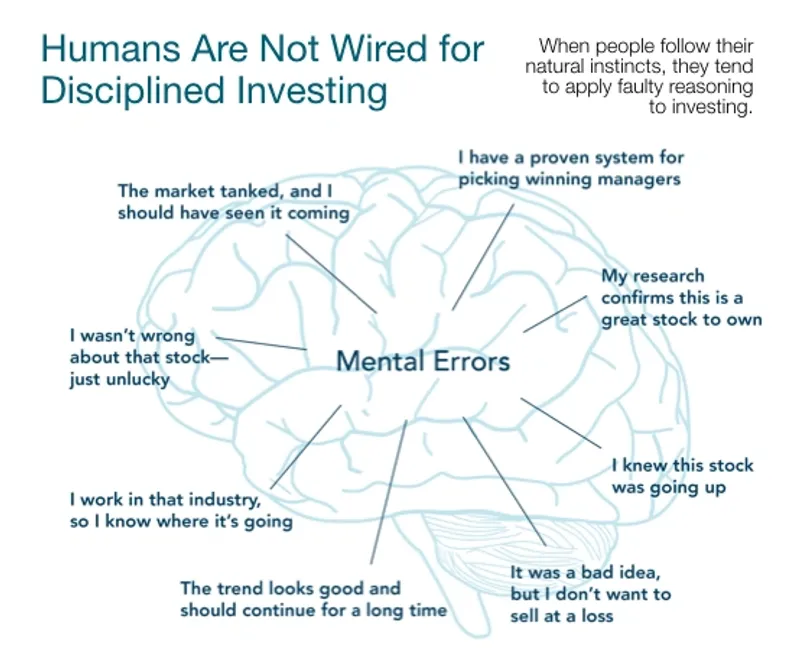
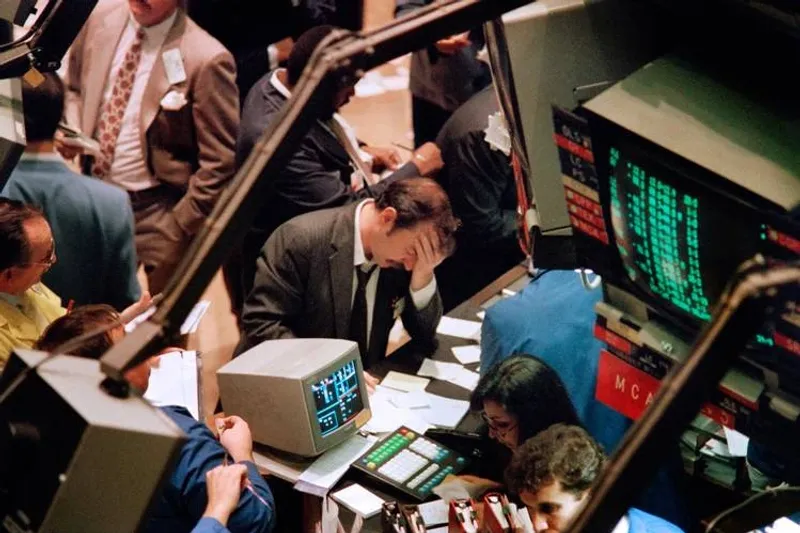
what if i put money in market and it goes down 50% ..?
since you are so much worried about 50% drop, do you know how many times market has dropped 50% during last 100 years .. let me make a guess … you have no idea .. but you worry about it all the time … right?
answer: 5 times … 1930-32; 1937-38; 1973-74; 2001-03 & 2007-09
btw, in 1987, even though DOW had the biggest one day drop, but the markets turned positive by the end of the year
1) these are rare events & i get really surprised that people are worried about an event that may happen once or twice in a quarter century .. & given your active investment life is about 50 years, you are not going to witness it more than 3 times …
2) let me surprise you with another piece of information .. these events, that may occur 2 or 3 times in your investment life, would be the luckiest moments of your life … think about when did Buffet made his best investments … do the years above mentioned bring some history to you mind .. Buffett was born in 1933; so, he missed the first two but captured the last three to become the richest investor in the world ..!)
3) what happens after a 50% sale in stock markets -?- S&P 500 has returned roughly 275% since then [as of Nov 2017]
how would i do as a trader based on above mentioned behaviors ..?
let’s start with traders: there are two kind of traders – the smart hedge fund guys who have ton of capital & information .. these guys make big money putting directional bets .. they survive if they are on the right side and die quickly if on wrong side .. but you only hear the stories about the ones who survive – they have houses in Hamptons, fly on helicopter to Manhattan and use a personal or charter plane to enjoy vacations in Bahamas.
second are option traders .. the man on the street .. they put stops on both sides; i.e. buy a put & call in the same trade (butterflies, condors etc.) .. they make some, lose some .. their odds of winning are 55/45 or something close in a trade .. some of them make good living, but mostly break even or close the account in six months ..
third are investors who have no clue of the market, they generally buy when the market is high [in current cycle] and sell when it is already sold .. but if they keep on doing the same thing for long time, then they win .. as a new cycle takes the market to a higher level .. market has been moving up in last 100 years .. so they make some money unless they time it well.
finally, the speculators .. who buy & sell with no logic .. i.e. following their brother-in-law or a friend or coworker .. these folks lose big and then share their stories about “how bad is the stock market” with whoever they meet.


be careful when you apply probability to the outcome of a future event …
in my opinion, probability is the most understood, misused & abused concept as applied in business situations & financial markets ..
first, let me describe where probability can be used in simple words …
1) there have been a large number of occurrence of an event in past (like tossing a coin 1000 times or something like that)
2) all the occurrences are the same (again, like tossing of a coin) or at least closely similar as it is hard to find same occurrences
3) based on the data collected on the outcome of past occurrence, we can calculate the probability of various outcomes of those events and use this data to predict the outcome of future event based
… this is nut-shell is the concept of probability.
now, here is how people misuse and abuse it ..
1) you only have data of handful of events in past … there is nothing wrong in using that data, but not in terms of probability, unless you have a large number of occurrences
2) those occurrences are same or at least closely similar because it is hard to find exactly similar situations in business world.
since it is hard to find large number of occurrence of major events in business world, probability or statistical analysis should only be used on production floor or medical testing data/situations, which provide a large number of similar events … for other situations, you may say that based on past experience, the outcome will be tilted in certain way, or certain outcome is likely, but not in terms of probability, which provides a higher / lower confidence in people’s mind based on the numbers used.
people become biased about their investments, the moment they own them (owner’s bias) ..!
this behavior is natural but it hurts you in investing … quoting Buffett, ” you may have feelings about the stock, but she has no feelings about you”
let me explain by giving an example: let’s say you have done your home work and purchased the apple stock @ price X … the moment you purchase the stock (taking long position), your thinking is strongly biased with apple @ price X that it is really hard for you to listen anything against your own position … it is true for ordinary people as well as the billionaires.
a recent example on this … in the middle of the year 2015 when crude was selling at $45, Boone Pickens – a really smart investor and billionaire – was asked to predict the crude prices at the end of 2015 … and he made a prediction of $70 … i understand that predictions can go wrong; however, if you are asking a guy who is long in oil/oil stocks and you ask a question about the oil prices in future … what do you think his answer will be ..? … & where the market ended the year ..!
similarly, when was the last time you heard Buffett taking about a negative opinion about US securities … both of these example show what i call owner’s bias .. the moment you take a position (long or short), your thinking no longer remains objective, instead you are simply supporting your position … or looking in reverse, the only way you can think objectively is when you don’t own a position.
now you know why i chose my tagline as investments minus emotions… emotions come along with any investments that you make, whether you like them to not, and you can’t control them … so, if you really want to make an objective decision (while you are holding a position), you need to consciously take your emotions out.
more on this topic on Humans/Psychology page.
are you worrying about the right thing(s) ..?
worrying is a natural and common human activity .. worry evokes memories and crates visions of possible future scenarios that alter an investor’s judgment about personal finances. Anxiety about an investment increases its perceived risk and lowers the level of risk tolerance.
as humans, we worry a lot about what we don’t know, which is natural; however, most of the time, people don’t want to handle or think about an issue ahead of time … we worry about something when it has already become an issue or when everyone else is worrying about it … remember, even if a few people know about something (either a good or bad news), it has already been reflected in the prices, because this is their job & people work round the clock [including yours truly] … most of the news is absorbed by the market within few minutes being out … so, worrying or talking about something that others already know is meaningless in context of investments because the other people/machines have already taken actions based on that
henceforth, i concluded the following: being emotional & irrational, people worry about the wrong things at wrong time; therefore, make wrong investment decisions … looking from a different perspective, what is relevant at any point in time depends on what kind of player (type of trader / investor) you are in the market.
here is a data point: when oil was selling at $80 – 100 (aug /sep ’14), no one would even talk about it … and i used to mention to people (mostly active traders) that oil is heading down & they will react to me saying, “really ..!”
anyway, in Q1′ 15, when oil was range bound between $40-50, everyone was worrying about it and wanted to know where it would go, and i would say, “who cares where oil would go ..?”… just enjoy that you’re paying less compared to 6 months ago … on top of that, if you did short oil last year, then you are sitting on huge gains [in Q1 ’15] … the point is that in general people miss the boat on both sides, worrying about the wrong things at the wrong time.
human behavior: in uncertainty, rather than finding the answers ourselves (which requires time & efforts, and gives you a competitive advantage), we try to find answers in our circles and eventually develop a position … then we try to validate the position with others, specially with folks who would not challenge us … and finally we act upon it … people often favor information that fits with their perception and ignore information that doesn’t, known as confirmation bias … basically, we try to build a consensus before taking an action; however, we don’t realize that a consensus in the best case scenario will only get us an average result in financial markets and if the crowd is wrong, which is true in most cases, your transaction will turn into a loss …
remedy: first, observe & think about something that no one else is thinking … build your own hypothesis and follow the steps as listed above … something solid to work with that will make you unique
human behavior: deep down human beings are social creatures … we seek acceptance from the group … it’s why conformity is so much easier than standing apart from the crowd, even when the crowd makes absolutely no sense, specially in panic situations … and those who don’t conform and think independently are labeled as radicals.
when dealing in financial markets, democracy is a disaster .. just because most of the folks agree on something, it does not automatically become right rather it’s their bias (due to prior commitment, belief, inertia or stubbornness) which becomes stronger based on the strength of the crowd.
remedy: run in the opposite direction to the crowd, your decision may be right or wrong; i.e. you may survive or not, but at least you know for sure that you won’t be crushed by the crowd ..!

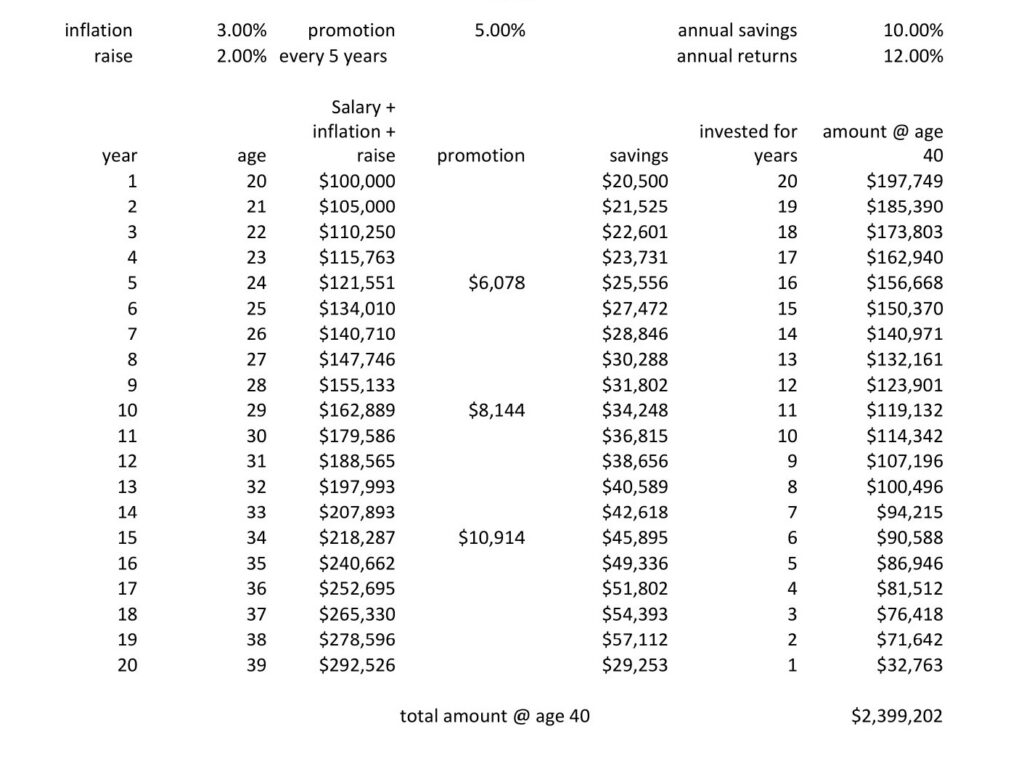
who wants to be a millionaire ..?
the answer to this question may be easier that you think .. all it requires is to start early, save consistently, & invest in US stock market as explained below
Einstein said, “compound interest is the eighth wonder of the world. He who understands it, earns it … he who doesn’t … pays it.” table on the left shows an example of someone who started working at the age of 20, earning $100,000, saving 10.00% of earnings and investing each year (each month will provide better results) in US stock market, which has provided roughly 12% annual returns, including dividends (past performance is no guarantee of future returns) .. also, assuming the salary is growing at 5% annually (3% inflation, 2% raise but no big promotions) .. can make you a millionaire at the age of 40 .. not bad ! … [illustrative purpose only as it doesn’t include taxes & commissions]
well, not everyone starts at $100,000 … but others don’t need to get disappointed .. a person starting at $60,000 annual salary @ age 20 can achieve the same goal if he saves 20% (instead of 10% in the example).
bottom-line: the goal is achievable for anyone … you either have to save more or wait a little longer … the key is to start early and invest consistently.